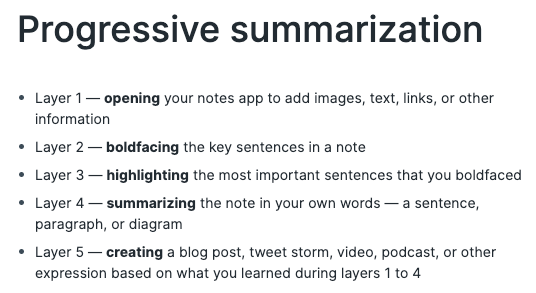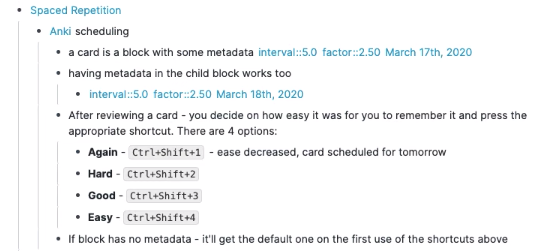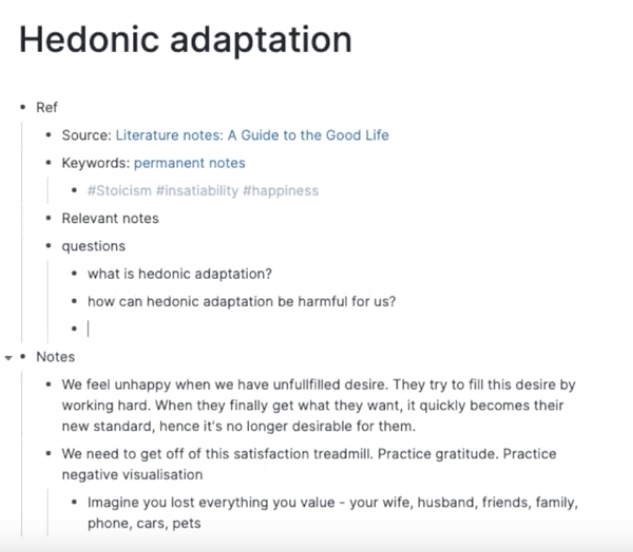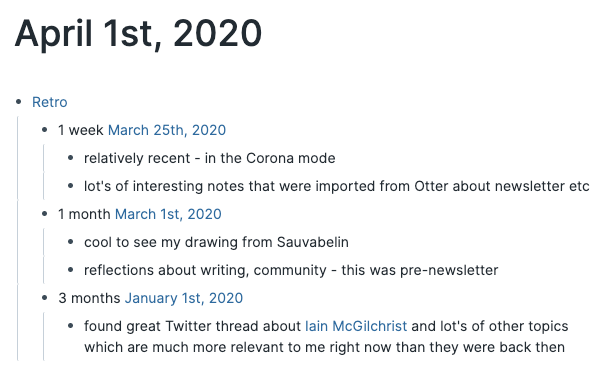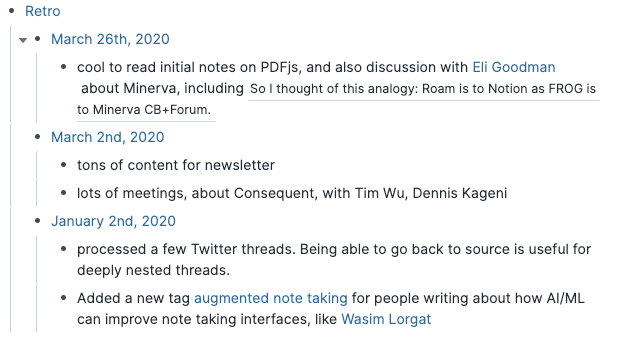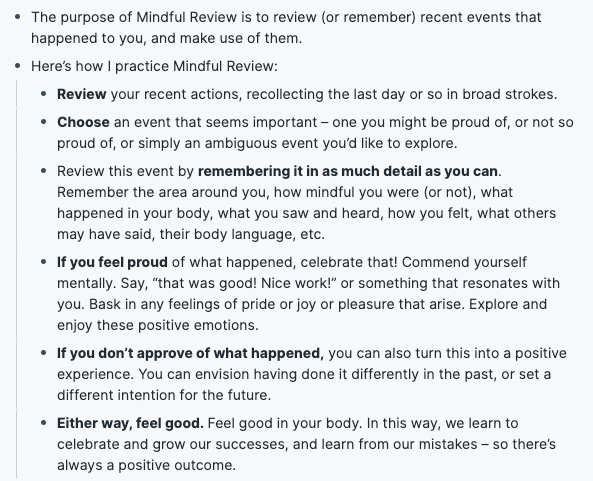📕 subnode [[@houshuang/retro concept]]
in 📚 node [[retro-concept]]
- #public
-
Video
- https://www.youtube.com/watch?v=dn1ia0YnuyY
-
Showcasing
- retro of Roam daily pages
- Spaced Repetition questions from Instapaper
- automatic scheduling of content to process, like old blog posts
-
Thread on retro of Roam daily pages
- Thread: I've been thinking a lot about spaced repetition, but more broadly what @andy_matuschak calls Spaced Everything ( https://t.co/Y1K4b4BfOc. The idea is to revisit notes and concepts at regular intervals, both to improve your memory, but also to
-
trigger new associations and insights. Traditionally Anki has been used for more factual questions, but I love Andy's "taxonomy" of cards, where he might ask himself to sing a song, reflect on a metaphor, refute the notion of philosophical zoombies, etc.
-
Embedded tweet by andy_matuschak
- I've gotten a bunch of questions about how I "encode knowledge" in flashcards. I think about it in terms of Bloom's taxonomy[1]. Here's the taxonomy juxtaposed with recent cards:
-
Embedded tweet by andy_matuschak
- but it also lazily defers the decision about which notes to spend more or less time on, and when you revisit things in the future you have a better view of their relative importance, and might be able to make interesting links to ideas you have thought about in the meantime.
- On the other hand, @fortelabs's concept of progressive summarization ( is the idea that you first capture things, and then revisit progressively adding structure and refinement. This spacing out in time again improves memory, because you are revisiting https://t.co/EtixIOs1Sw
- The Roam Toolkit also has support for more advanced SRS algorithms However, I just thought of a much simpler approach that seems to give much of the same benefits: daily page retro. Every day, I add a link to my daily page 7, 30 and 90 days ago. https://t.co/uQLmMeNz8m
- There's been a lot of enthusiasm around spaced repetition in @RoamResearch, and I particularly like @ShuOmi3's implementation of adding SRS questions while note taking Advantage of doing it all in Roam is that you can always expand context. https://t.co/zB2tVqmSF5
-
@cortexfutura talks about what progressive summarization would look like in Roam, and proposes the term Context-Dependent Insight. @JoelChan86 proposes the term incremental formalization, which I also like ( https://t.co/lpGksQny2Y
- https://roamresearch.com/#/app/megacoglab/page/uqjCEC29Z
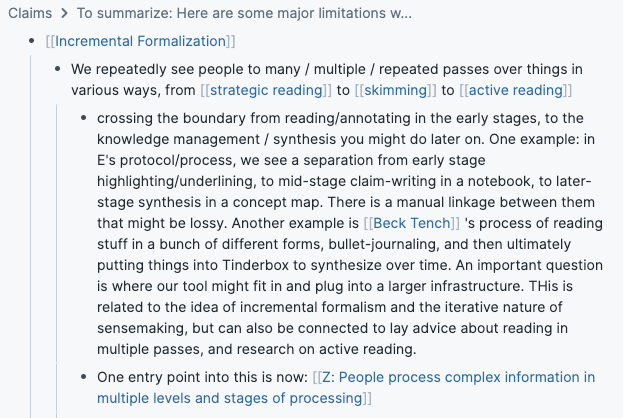
- but has a lot of benefits. You can revisit personal anecdotes (that's when my son did something cute), look back at predictions (I thought this project would go in a certain way), at practices (I tend to overestimate my time), emotions, but also process your notes...
-
Then I click on that link, and revisit my notes. I ingest almost all of my primary content on Roam through my daily pages, but I also take notes on my emotions, motivations, ideas, meetings and time usage (how much varies a lot). This practice takes only 10 minutes a day, ...
-
less pressure to assign the perfect tag right now. I also take a few notes on my retro, which means that when I retro the current page, it functions as a portal to my older notes as well - providing denser interlinking...
-
see new connections, and so some "incremental formalization" as @JoelChan86 calls it ( Also makes me feel good that I can simply capture stuff on the daily page, and know that it will get revisited, it won't disappear into the black hole of old notes -
- https://roamresearch.com/#/app/megacoglab/page/uqjCEC29Z
- I found a long Twitter thread from January which at the time seemed intriguing, but I didn't quite know "what to do about it". Now the topics are very relevant to other things I've read, and I went through adding some tags to make sure I rediscover. I look back at old ideas I had
- Revisiting personal events, emotions etc is a bit similar to @tasshinfogleman's concept of Mindful Review He also talks about an interesting concept of Lembranisation. https://t.co/rSOfORs1DV
-
Gmail retro
-
-
I added another aspect to my retro process in - email retro. I have had GMail since 2004 (remember sending someone a postcard from Mongolia to get a beta invite from them :)). Most of the emails is of course cruft, but hidden among the cruft there are gems. - Twitter thread by Stian Håklev (侯爽), link #myTwitterThreads #**Retro concept**
-
In the last 15 years, I must have hundred of pages of ideas, reflections, etc. I used to write really long emails to my best friends, my PhD supervisor etc. Now I want to capture some of those, and put them in Roam. But where to start - I've sent 36,000 emails! https://t.co/FSMWdiuSjP
-
Well, how about a search which shows you only the emails you've written on today's date, for each of the previous years? Tedious to do manually, but with a quick Node script (https://github.com/houshuang/hypothesis-to-bullet/blob/master/daily.mjs) we can easily generate it. https://t.co/p3kFMO4Uf1
- About 115 conversations for today. But just looking at the titles and senders etc, it's easy to dismiss most of it. Time will tell if I find this useful, or overwhelming. I can of course easily limit the range of years (instead of finishing the full review in 365 days)
-
I could stretch it out over several years. Note that some of the dates are not exact, because I'm using conversation view, so it finds threads containing a post written by me on today's date. This means I also find people's responses, but I filter out all incoming notifications. https://t.co/wZ1lYQit24
-
In the last 15 years, I must have hundred of pages of ideas, reflections, etc. I used to write really long emails to my best friends, my PhD supervisor etc. Now I want to capture some of those, and put them in Roam. But where to start - I've sent 36,000 emails! https://t.co/FSMWdiuSjP
-
I added another aspect to my retro process in - email retro. I have had GMail since 2004 (remember sending someone a postcard from Mongolia to get a beta invite from them :)). Most of the emails is of course cruft, but hidden among the cruft there are gems. - Twitter thread by Stian Håklev (侯爽), link #myTwitterThreads #**Retro concept**
-
-
Other thoughts:
- Love this idea! Riffing: divide emails into N segments (by year/phase): each conditions a GPT2 model that "comments" on things you write (and comments are entry points into specific emails). Viola, ongoing conversations with yourself(s)! Joel Chan comment on Retro concept
- reading things as a way of doing retro of your own thoughts. When I read something about juggling, it's not so much that I'm learning something new about juggling. But I'm revisiting something that I used to do a lot. And I see it in a different perspective, based on all the things I'm reading and thinking about right now. #**Retro concept**
📖 stoas
- public document at doc.anagora.org/retro-concept
- video call at meet.jit.si/retro-concept

